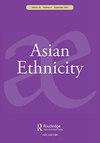Strategic races: understanding racial categories in Japanese-occupied Singapore
IF 0.8
Q3 ETHNIC STUDIES
引用次数: 0
Abstract
ABSTRACT This paper examines Japanese policies toward different races (minzoku) in Singapore during the Second World War. These policies, which victimized the Chinese community and appeared to favor others such as the Malay and Indian communities, fostered inter-racial resentments that would persist long after the war. Drawing on internal occupation guidelines produced by the Japanese state and the accounts of the administrators who implemented them, this paper shows that the treatment of the Chinese community was in fact a direct result of the perceived significance of these groups to the success or failure of Japan’s wartime imperial project in Southeast Asia. Groups whose importance the Japanese initially dismissed, however, had greater freedom to chart their own destinies and demand Japan live up to its promise of an “Asia for Asians” as the war progressed.战略种族:了解日占新加坡的种族分类
摘要本文考察了第二次世界大战期间日本在新加坡对不同种族的政策。这些政策伤害了华人社区,似乎有利于马来和印度社区等其他社区,助长了种族间的怨恨,这种怨恨将在战后长期存在。根据日本政府制定的内部占领指导方针和执行这些指导方针的行政人员的描述,本文表明,华人社区的待遇实际上是这些群体对日本在东南亚的战时帝国工程成败的重要意义的直接结果。然而,日本人最初否认其重要性的团体有更大的自由来规划自己的命运,并要求日本在战争进行时履行其“亚洲人的亚洲”的承诺。
本文章由计算机程序翻译,如有差异,请以英文原文为准。
求助全文
约1分钟内获得全文
求助全文
来源期刊

Asian Ethnicity
PHYSIOLOGY-
CiteScore
2.80
自引率
6.20%
发文量
27
期刊介绍:
In the twenty-first century ethnic issues have assumed importance in many parts of the world. Until recently, questions of Asian ethnicity and identity have been treated in a balkanized fashion, with anthropologists, economists, historians, political scientists, sociologists and others publishing their studies in single-discipline journals. Asian Ethnicity provides a cross-disciplinary, international venue for the publication of well-researched articles about ethnic groups and ethnic relations in the half of the world where questions of ethnicity now loom largest. Asian Ethnicity covers any time period, although the greatest focus is expected to be on the twentieth and twenty-first centuries.
 求助内容:
求助内容: 应助结果提醒方式:
应助结果提醒方式:


